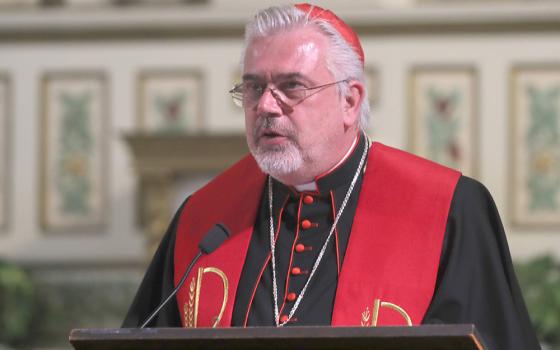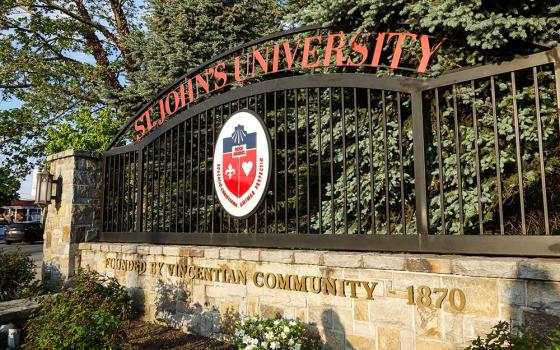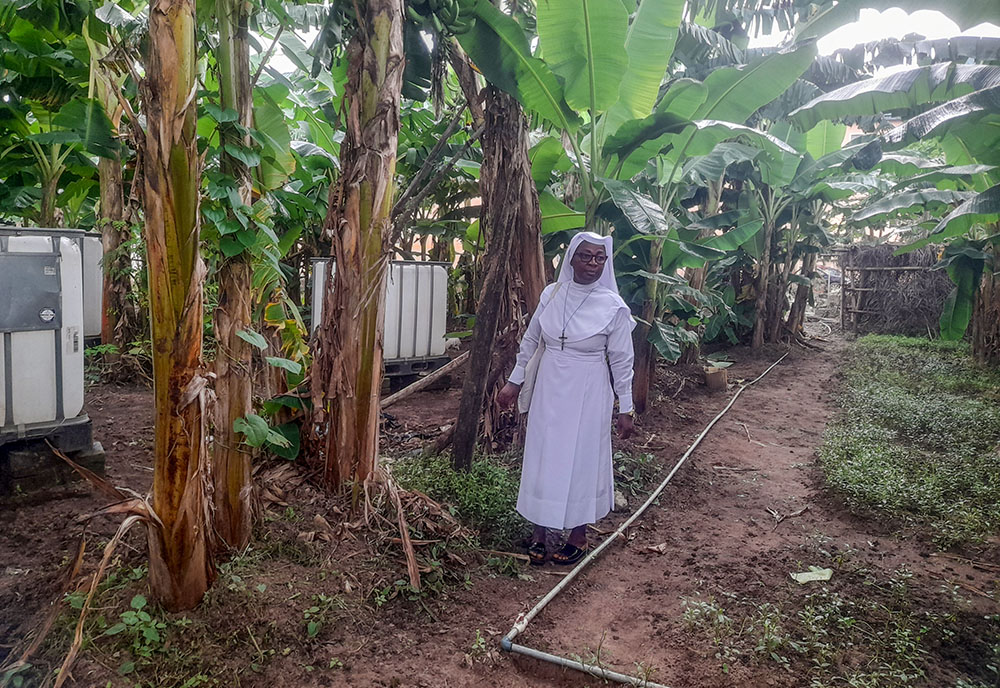
Sr. Maria Obiomachukwu Osuji walks through the farm as she inspects crops cultivated by the Sisters of the Immaculate Heart of Mary, Mother of Christ, in Aba, Nigeria. (GSR photo/John Chukwu)
In the bustling commercial city of Aba, southeastern Nigeria, better known for its sprawling markets than for environmental activism, Catholic nuns from the Sisters of the Immaculate Heart of Mary, Mother of Christ, are quietly leading a grassroots climate movement.
By cultivating organic farms, planting trees and preaching climate responsibility, they are turning their religious calling into a practical force against ecological collapse.
At the heart of this effort is Sr. Maria Obiomachukwu Osuji, a nursing lecturer at the Archbishop Charles Heerey Memorial College of Nursing Sciences, located in the Ogbor Hill area of Aba.
When she is not in the classroom, Osuji is often tending to a modest farm tucked behind the sisters' convent, just steps away from the school's main academic block.
Across the campus, trees planted by the sisters now stand tall, symbolizing both environmental hope and a commitment to one of its congregation's core apostolates: environmental sustainability.
"We have different sets of trees," Osuji said. "The palm trees in the compound now will be about plus or minus 120. Then the coconut trees should be between 30 and 40. We have up to 10 mango trees in the compound. We have avocado pear, and soursop trees. We have oranges and pawpaw plantations. We have a place solely for plantain, bananas."
Osuji stressed that farming is part of their training as Immaculate Heart sisters, pointing out that late Archbishop Charles Heerey, who is their founding father, advised that farming is not to be beneath them.
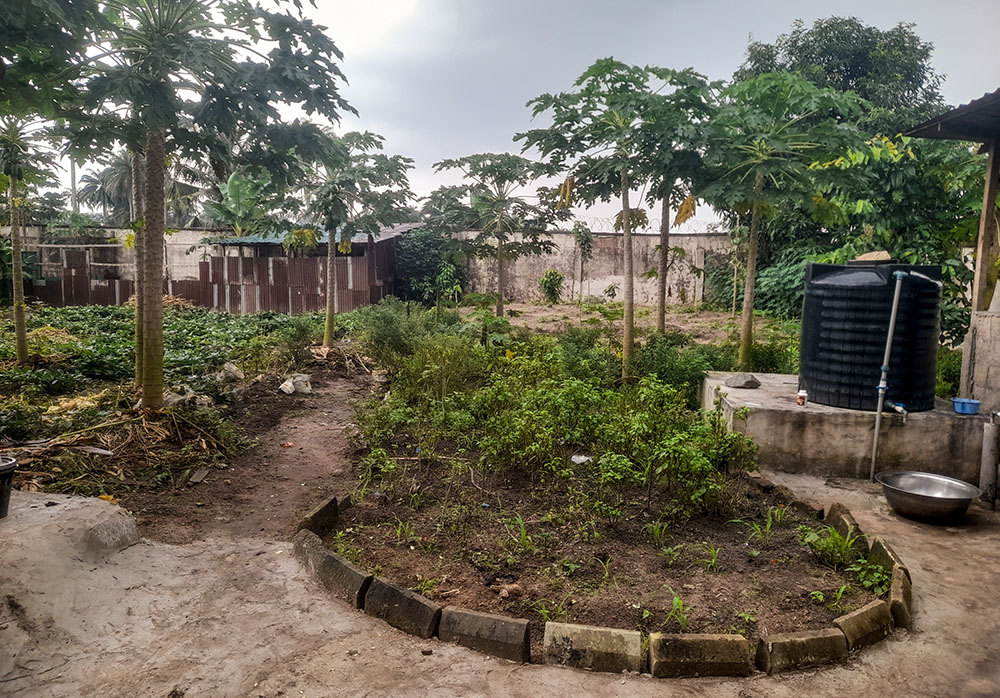
Scent leaf cultivated by the Immaculate Heart sisters as part of their organic farming practices (GSR photo/John Chukwu)
She emphasized that beyond the aesthetic and food-yielding value of the trees, "this is the area where we are promoting protection of the environment, doing many things that will help sustain our mother Earth, the planet that God has given us."
Nigeria's climate change challenge
Nigeria is grappling with a range of environmental challenges, from shrinking water resources to degraded farmland, all intensified by the growing impacts of climate change.
The country is also facing rapid deforestation and loss of vegetation, leading to biodiversity decline, land degradation, erosion, flooding, drought and desertification, particularly in its semiarid regions.
Rising temperatures, shifting rainfall patterns, and extreme heat are compounding these problems. Lanre Olagunju, a climate change expert and editor of CheckClimate Africa, told GSR that the primary drivers include "rising global temperatures due to greenhouse gas emissions, changes in rainfall distribution, and deforestation. Urbanization without proper drainage infrastructure also contributes to flooding, while land degradation exacerbates desertification."
Advertisement
A deadly flood on May 29, 2025, swept through Mokwa, a town in Niger State, north central Nigeria, killing more than 200 people with more than 700 missing. Back in 2022, nationwide flooding saw 600 people dead and at least 1.3 million displaced.
These recurring disasters have laid bare the country's urgent need for stronger climate action and adaptation measures.
"Climate disinformation is a major stumbling block to climate action and awareness," Olagunju said. He added that the lack of contextualized climate education, especially at the grassroots, contributes to this devastating turn.
Dealing with the challenge
Sr. Maria Tochi Ezechukwu, who assists Osuji with farm work after her bursary work at the nursing school, said the trees they have planted play a vital role in reducing the risk of flooding in their area.
"They also provide shade during intense heat," she said. "On several occasions, they shielded us from destructive winds and lightning."
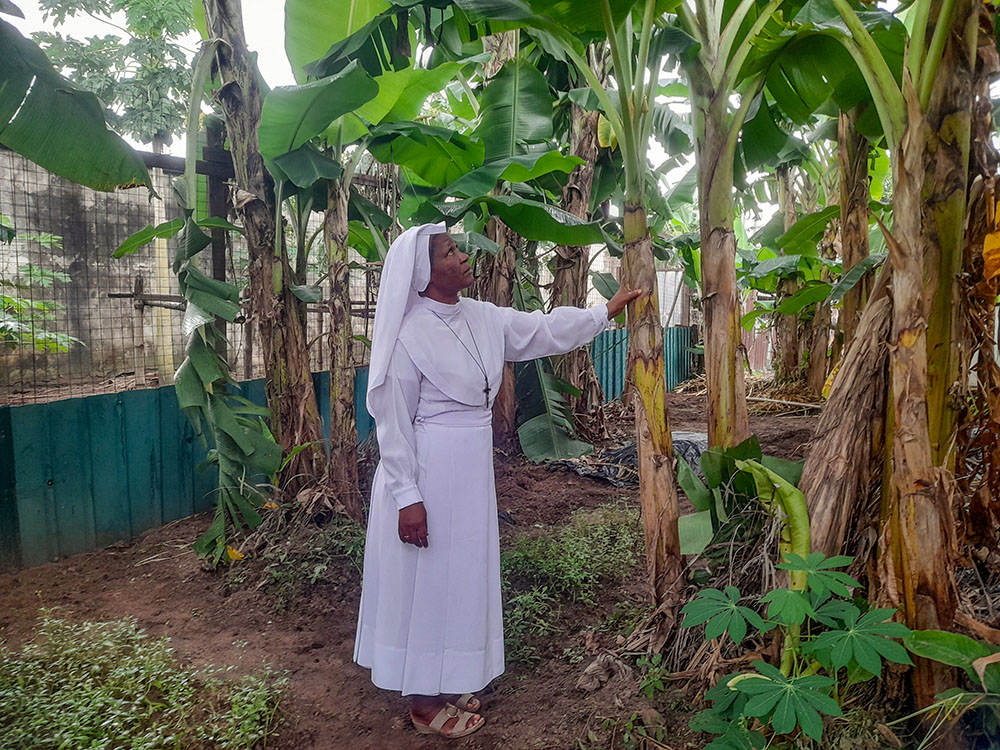
Immaculate Heart Sr. Maria Tochi Ezechukwu inspects a plantain tree at the sisters' farm in Aba, Nigeria. (GSR photo/John Chukwu)
Explaining how their farming supports climate action, Osuji told GSR that tree planting helps capture and store carbon in the soil, mitigating the effects of greenhouse emissions.
"The trees trap carbon and hold it in their roots," she said. "They've also transformed the atmosphere around the convent, making it more serene and refreshing, a benefit that extends across the campus and into the surrounding community."
Sr. Maria Chinenye Nwagwu, who also helps tend the farm, said their cultivation efforts reflect the congregation's commitment to environmental sustainability. "You don't remove any tree without replacing it," Nwagwu said. "Before a tree is cut, another must be planted."
Gloria Okafor, a climate scientist and researcher, noted that deforestation remains a major driver of climate change. "Tree planting and reforestation are valuable tools for carbon sequestration, erosion control, and microclimate regulation," she said. "However, their effectiveness depends on proper species selection, community involvement and long-term maintenance."
In their response to the climate crisis, the sisters are also embracing eco-friendly farming practices. They produce organic pesticides using urine collected from the goats and chickens they rear, a method Osuji said helps the environment. She explained that chemical pesticides degrade the soil and water, while an organic approach keeps the land healthy.
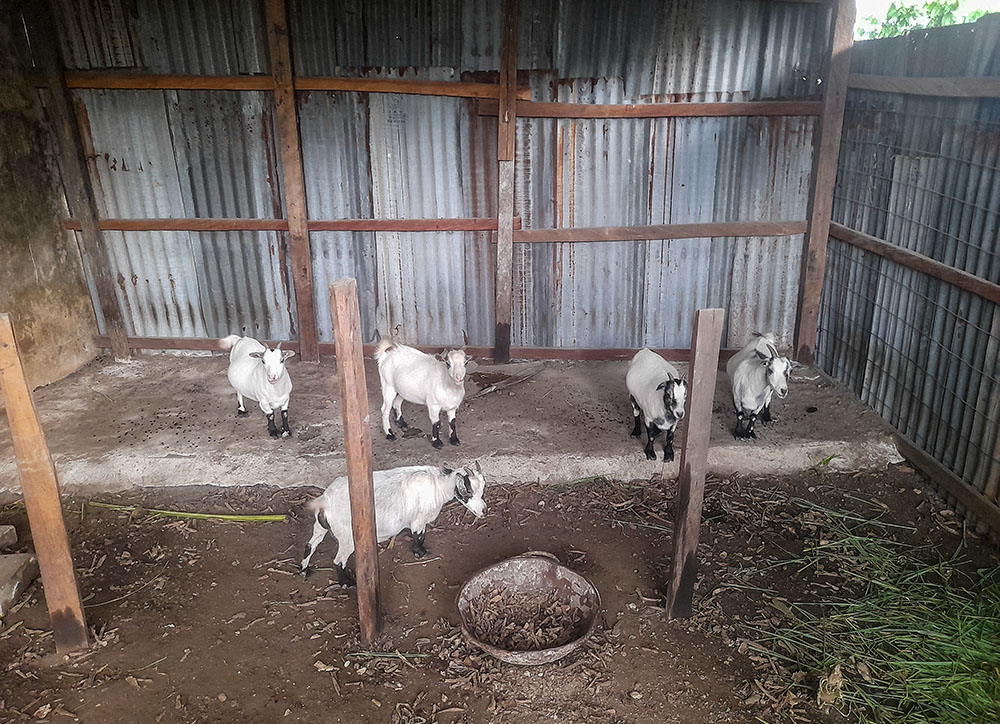
Goats reared by the Immaculate Heart sisters, whose waste is used to produce organic pesticides for eco-friendly farming in Aba, Nigeria. (GSR photo/John Chukwu)
The sisters are committed to composting as a means of producing organic manure. Osuji noted that the process, which uses food waste like banana peels, yam skins and tomato remnants, typically takes two to three months to yield usable fertilizer.
She stressed that composting improves soil health, supports plant growth and enhances carbon sequestration, adding that it also reduces the need for harmful chemical fertilizers.
Beyond agricultural practices, Osuji also uses digital platforms to raise climate awareness. She said she regularly shares updates on WhatsApp, encouraging her contacts to take simple environmental actions. "I always urge people to plant trees in any space they can find around their homes," she said.
Despite their dedication to climate-resilient farming, Osuji lamented several obstacles facing their efforts: limited land for cultivation, persistent pest infestations, irrigation challenges during the dry season, and insufficient funding for essential farming equipment. Yet, she remains unwavering in her conviction.
"We don't need to go to Mars or Jupiter," she said. "Earth is our common home. It's our responsibility to protect it."





